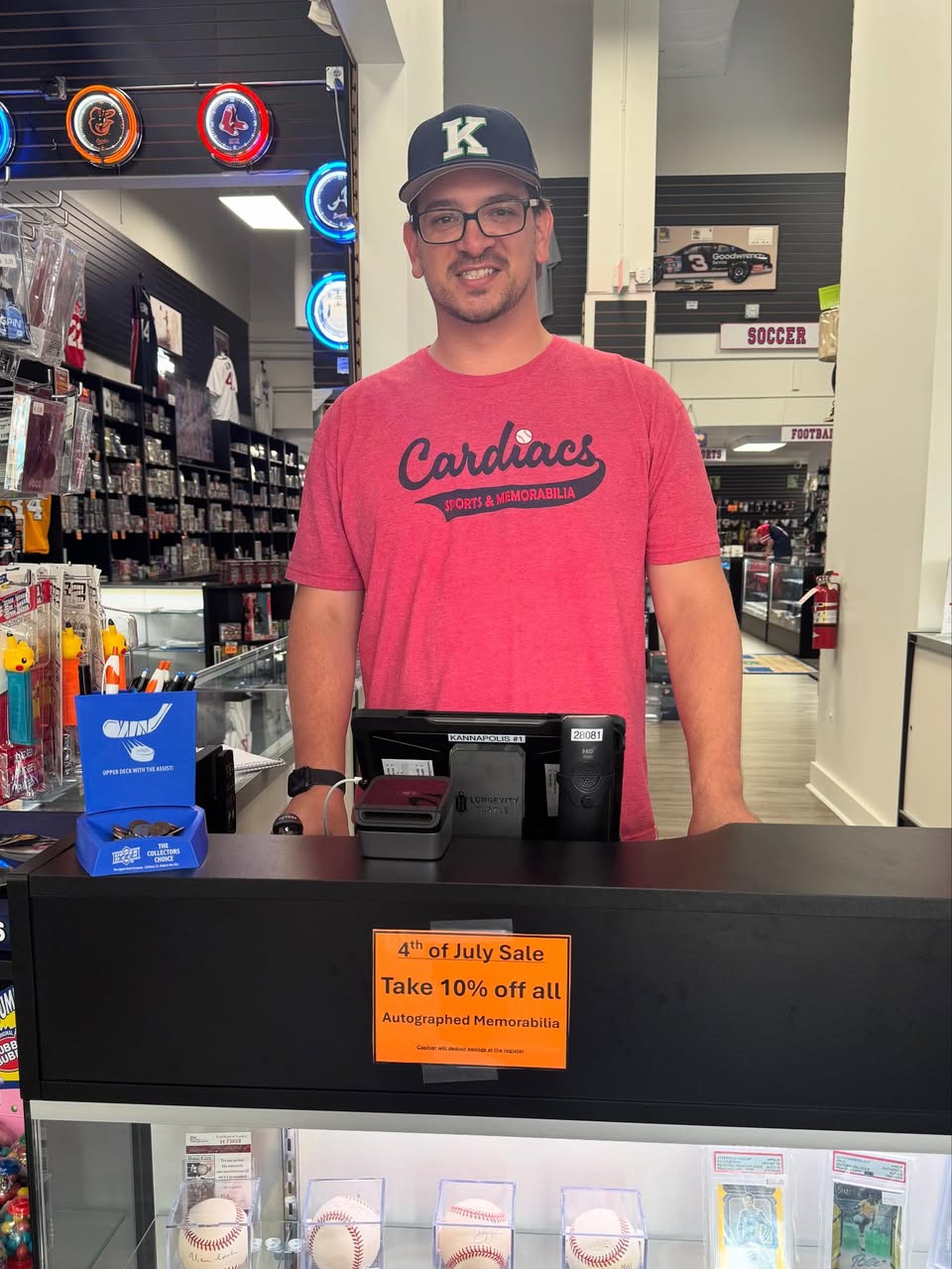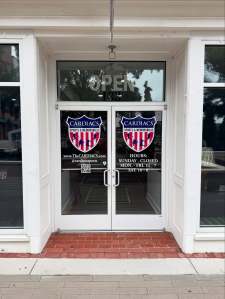
Cardiacs, Kannapolis
By Miike London
Salisbury Post
KANNAPOLIS — Jeff Cannon got out of the service in the late 1980s and discovered that his childhood hobby — collecting baseball cards — had spiraled out of control.
“Started getting back into the hobby and cards were all over the place,” Cannon said.
Cards quite literally were everywhere, even at Food Lion where stacks of 1988 Donruss cards were winning the battle with cantaloupes and canned goods for floor space.
Millions and millions of cards were being printed by a wave of new manufacturers, as card companies generated unprecedented print runs to meet the massive amount of cards being ordered by sellers.
The cards were consumed hungrily by eager collectors, as well as by profit-seekers who spotted a chance to turn quick bucks. Baseball fans in the 1980s bought “rookie” cards, that’s the first-year card, of their favorite sluggers and hurlers in bricks of 10 and 50 and 100. Bedroom closets overflowed with card albums (9 per plastic sheet), unopened boxes and even unopened cases.
Speculators dreamed that the cards of the 1980s would one day be as valued as the cards of the 1950s and 1960s. They hoped Jose Cansecos eventually might be as prized as Mickey Mantles.
But those older cards had been frequently thrown out by spring-cleaning moms or died terrible deaths by being stuck between bicycle spokes or thumb-tacked to walls. Not that many were made to begin with, and a high percentage of those that were made did not survive in decent condition.
Eventually the tried and true laws of supply and demand took over a hobby that had run wild by the early 1990s and people discovered that for every new collector who wanted a Darryl Strawberry or Doc Gooden “rookie,” there were 50 people who would be thrilled to sell him one. Sanity returned and prices tumbled. In 2025 you can buy Darryl and Doc, whose can’t-miss careers flamed out long before that call from Cooperstown ever came, for less than they would have cost 40 years ago.
With overproduction, card manufacturers killed the goose that had been laying golden eggs for them, although there were a few card issues from the 1980s — the famed 1986 Fleer basketball set would fit into that category — that are reasonably scarce. Those cards have skyrocketed in value and have managed to maintain absurd price levels.
Jeff Cannon and his brother, Johnny, were two of the people who never lost the passion for baseball cards even after things went sour because they had collected for all the right reasons – they loved the cards and they loved the game. Sure, it was cool that cards were worth something, but that was secondary to the thrill of collecting.
In 2007, the brothers took a leap of faith and made a plunge into the sports memorabilia business, an industry that is centered around baseball cards, but has hundreds of spin-offs, including cards of just about anything you can think of. The Cannons opened a store in Cary called Cardiacs — their original inventory consisted of their own collections – that eventually moved to Apex.
Eighteen years later, that 6,000-square foot Apex store is still thriving. Jeff Cannon, who lives in Granite Quarry, is a pastor so you can believe him when he says the store is the largest in the state and is rated as one of the top five baseball cards stores nationally.
The Cannon brothers are A.L. Brown graduates, so the opportunity to open Cardiacs No. 2 in renovated downtown Kannapolis, was not something they could say no to.
“Especially being Cannons and with the Cannon Ballers baseball team playing a block away,” Cannon said. “That’s a great draw and we’ve got a good relationship with them.”
Cardiacs has been in its present location at 133 West Ave. about five months.
If you’re used to mom-and-p0p baseball card stores, the vastness of Cardiacs will be a little overwhelming. It seems to go on forever because the Cardiacs store area encompasses the space that once housed five separate stores. There’s a roster of 10 employees, with three or four on duty at a given time.
There are some high-end autographed and certified items with four-figure price tags that create an impressive display. Whether they ever get sold or not, it’s cool to see Shaq’s autographed shoes and Derek Jeter’s autographed glove in Kannapolis.
Cannon explained that Cardiacs has the clout and the capital to purchase plenty of cases directly from the card manufacturers, and they have close partnerships with outfits like Upper Deck when it comes to obtaining professionally authenticated and autographed items.
A lot of the sales are packs, packs of everything from hockey to Amazing Spider-Man to Walt Disney to NASCAR to football. The cash register rings pretty steadily.
Poke’mon cards are big. At some card shows, that portion of the hobby takes up almost half the tables. Cardiacs sells Poke’mon, but it’s just a fragment of the overall business.
“The Poke’mon cards are important to some of our best and most regular customers,” said Cardiacs employee Casey Paddock. “It’s not just a craze to them, it’s what they like to collect. The advantage Poke’mon has on baseball cards is they don’t retire, they don’t slump, they don’t get traded — and they don’t have scandals.”
Zach Erwin is a teacher at A.L. Brown, but teachers only get paychecks for 10 months out of the year, so he supplements his income working summer shifts at Cardiacs. He’s a sports guy and knowledgeable about the hobby, so he loves his part-time job.
“The card collecting hobby has shifted from set-building to being centered around chase cards,” Erwin explained. “Younger collectors buy boxes and packs going after those autographed and numbered limited edition cards of their favorite players and teams.”
Erwin said Cardiacs recently sold an autographed/numbered Shohei Ohtani card for $3,000.
Ohtani is about as good as it gets and his cards are likely to always be popular with collectors, but $3,000 sounds like a risky investment for a new card even if it’s a 1 of 1.
There’s a very limited Tom Brady card on sale for $3,750, but it is still looking for a new home.
“You’ve also got guys who have stood the test of time — like Michael Jordan,” Erwin said. “We still sell a lot of Jordans.”
There’s a showcase filled with “vintage” cards. Those are the cards from the old days when Topps was often the sole manufacturer. That’s where you can find a Mickey Mantle, a Willie Mays or a Ted Williams. And if you’re looking for a Billy Kilmer rookie card (1962 Topps), Cardiacs has it.
A lot of Cardiacs cards are graded. That’s been a huge adjustment for the hobby. The advantage of graded cards is you know they’re authentic, and graded cards also have a pretty standard price scale. Cards that aren’t graded — “raw” cards — have a much less rigid price structure. There’s generally some room to negotiate.
There’s so much store space that an entire showcase is devoted to cards of local players such as A.L. Brown graduates Haskel Stanback, Mike Morton and Lance Smith and Northwest Cabarrus’ Seager brothers. Also visible are an autographed Owen White (Carson) and a Cobb Hightower. Hightower, an East Rowan graduate and a 2024 draft pick, is in the 2025 Bowman issue.
Bowman is essentially an all-rookie product now, filling that niche in the hobby nicely.
Erwin is excited about the possibility of having cards of CJ Gray and Kane Kepley — two locals who just got drafted — for sale in the near future.
“If CJ signs, we could have CJ cards in here as early as October,” Erwin said.
There are always buyers as well as sellers. Cannon said he recently purchased a collection of hundreds of thousands of cards. Some of them were from the overproduction era and are worth less than the cardboard boxes they were stored in, but there also was some good stuff in there.
That’s still the fun part for Cannon after all these years, going through those collections, searching for hidden treasures.
“We’ve bought some really vast collections,” Cannon said. “We’ve got millions of cards stored down in the basement here.”
You may find bargains if you visit Cardiacs, but it’s not a flea market, it’s a retail store with a cash register. What you are certain to find is a positive experience, and that’s the goal of everyone at Cardiacs.
“When you come in here, you’ll get a friendly smile and great service from knowledgeable employees,” Cannon said. “That’s what made the store in Apex so successful.”








